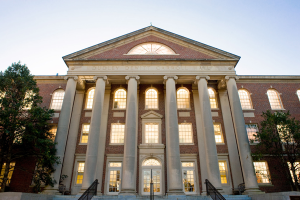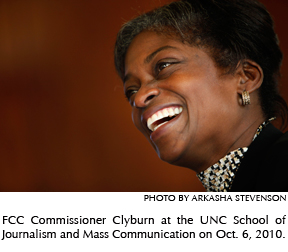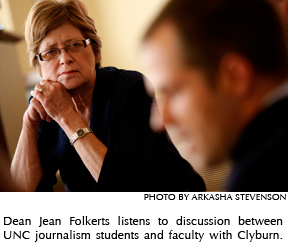FCC commissioner Clyburn visits Carolina’s journalism school

 FCC commissioner Mignon Clyburn met with UNC Hussman School of Journalism and Media faculty and students Wednesday, Oct. 6, in Chapel Hill to discuss the past decade of American media and what their future might hold.
FCC commissioner Mignon Clyburn met with UNC Hussman School of Journalism and Media faculty and students Wednesday, Oct. 6, in Chapel Hill to discuss the past decade of American media and what their future might hold.
The FCC has been studying the future of the media and is expected to release its findings later this year. Clyburn said she came to Chapel Hill in an effort to hear voices she wouldn’t hear in Washington, D.C. Clyburn also visited WRAL-TV in Raleigh on Tuesday.
Clyburn’s visit to Chapel Hill was sponsored by the UNC Center for Media Law and Policy, a collaboration between the UNC journalism and law schools. The center is a forum for study and debate about the important media law and policy issues facing North Carolina and the nation.
Five UNC journalism professors and four graduate students talked with Clyburn about their research and professional experiences related to topics including the near collapse of metropolitan daily newspapers and the increased use of online contracts to regulate behavior on the Internet.
Jean Folkerts, dean of the school, said that policy decisions are crucial in the early stages of technology development. “This period for the Internet is analogous to the early days of radio, when that industry was in chaos,” she said. “Policy decisions shaped the broad outlines of commercial and public radio, and the decisions to be made by the FCC and others are shaping the broad outlines of the Internet.”
 Faculty member Ferrel Guillory suggested that fewer reporters working for metropolitan newspapers could severely diminish public knowledge about the workings of government. He said newspapers still do investigative reporting, but that more governing occurs without a reporter in the room. “Newspaper watchdogs still bark, but they spend less time just watching,” he said. “The country needs watchdogs who just watch, as well as those who bark.”
Faculty member Ferrel Guillory suggested that fewer reporters working for metropolitan newspapers could severely diminish public knowledge about the workings of government. He said newspapers still do investigative reporting, but that more governing occurs without a reporter in the room. “Newspaper watchdogs still bark, but they spend less time just watching,” he said. “The country needs watchdogs who just watch, as well as those who bark.”
Doctoral student Woodrow Hartzog advised the commissioner that increasingly Internet communication is controlled not by government but by online contracts. He said that Internet users routinely click to agree to the terms of those contracts without reading them, not realizing that they are legally binding in most cases.
Penny Abernathy, the school’s Knight Chair in Journalism and Digital Media Economics, described her work helping three small N.C. newspapers develop viable business models for the digital age. She told Clyburn that a lack of broadband penetration in some small towns is hampering the efforts of newspapers in those towns to develop profitable websites.
“We appreciated the opportunity to share our expertise with Commissioner Clyburn because she is in a position to help determine the future of the American media,” said Cathy Packer, a journalism professor and faculty director of the UNC media law center. “The commissioner asked questions and was clearly engaged. I think the meeting was especially relevant for her because she a former newspaper publisher. She understands the media business.”
The FCC regulates interstate and international communications by radio, television, wire, satellite and cable. The FCC's jurisdiction covers the 50 states, the District of Columbia and U.S. possessions. Clyburn is one of five commissioners who direct the FCC.
Clyburn began her term at the FCC in August 2009. Prior to that, she served for 11 years as the representative of South Carolina’s sixth district on the Public Service Commission (PSC) of South Carolina. Before joining the PSC, she was the publisher and general manager for 14 years of The Coastal Times, a Charleston-based weekly newspaper that focused primarily on issues affecting the African-American community. She owned and operated the family-founded newspaper following her graduation from the University of South Carolina, where she earned a bachelor’s degree in banking, finance and economics.